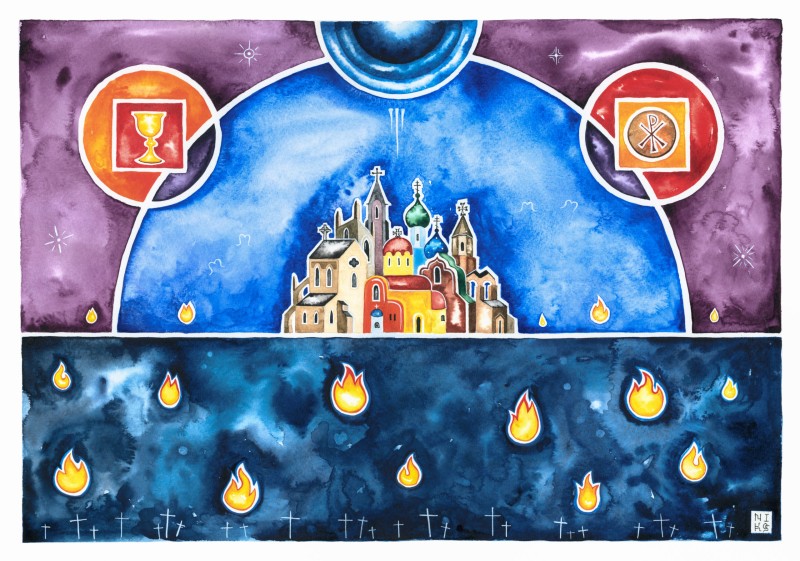As part of CEC’s Theological Reflections series “Communion in crisis: The Church during the COVID-19 pandemic,” Dr Katherine Shirk Lucas from the Catholic University of Paris, reflects on seeking, sharing, and serving the risen Lord: the Church as communion during the Covid-19 pandemic.
The Church: Towards a Common Vision expresses how far Christian communities have come in their shared understanding of the Church. In its 2019 official response, the Catholic Church recognises a “deep convergence” on the understanding of the Church as communion whose source is the life of the Triune God. “Communion … is both the gift by which the Church lives and, at the same time, the gift God calls the Church to offer to a wounded and divided humanity in hope of reconciliation and healing” reads in the document The Church: Towards a Common Vision. Communion is manifested in three interrelated ways: unity in faith, in worship and the sacramental life, and in service. The Covid-19 crisis has challenged the Church to cultivate and share communion despite the deprivation of congregations gathering in sanctuaries for worship and the hardships of vulnerability, suffering, loss, and mourning. How has the Catholic Church contributed to this fundamental Christian mission?
Encountering the risen Christ in times of sacramental abstinence
Catholic communities have developed digital worship in diverse and creative ways. Building on the established practice of broadcasting major papal liturgies, Pope Francis has made extensive use of digital media to express solidarity with the hurting world, such as his Urbi et Orbi prayer and blessing on 27 March, 2020, and the Way of the Cross on 10 April, 2020. These innovations highlight the global reach of Catholicism and invite renewed ecumenical reflection on Petrine ministry as a service of love and unity in the spirit of the encyclical Ut unum sint (95).
From the perspective of Catholic sacramental theology, digital technology cannot yet support the fullness of sacramental life, and eucharistic consecration is not currently considered possible across distances. In some dioceses, sacramental discernment has centered on spiritual connection through Mass and the divine office offered in different digital forms. Some diocesan bishops have suggested the faithful pray St. Alphonsus Ligouri’s “Act of Spiritual Communion” to express their desire to be united with Christ in love while unable to consume the eucharistic elements. This eighteenth-century prayer emphasises personal intimacy with Christ rather than ecclesial communion and witness to Christ’s love.
Theological assessment of these pastoral choices has focused on whether they represent reception of Vatican II reforms. Do decision-making procedures heed calls for synodality and take the voices of the faithful, especially those of women, the majority of Catholic lay ministers, into account? Does digital mediation ensure the fully conscious and active participation required by the very nature of the liturgy? Do livestream Masses in the absence of an assembly draw excessive attention to the male priest as the primary public figure of the Catholic Church? Has ordained ministry been overly shaped by concern for ritual action? Does emphasis on individual spiritual communion encourage the ecclesial fulfillment of the eucharist through diaconal service and charity? Do the time and resources spent on worship balance with our investment in attending to our neighbours, in being a Church of the poor, for the poor?
The lockdown experience has also raised awareness of Christian communities who have been gathering online for many years and of the faithful who have been excluded from parish life by attitudinal and architectural barriers. These realities require further theological reflection and pastoral commitment. How do online practices enhance our comprehension of the abiding presence of the Incarnate Word, who promises, “Where two or three are gathered in my name, I am there among them” (Matthew 18:20)? How may we more fully apprehend and appreciate the differently embodied quality of online worship and its contribution to creating communion? How may Catholic parishes be more inclusive of people of all abilities?
Common faith in the Trinity as a basis for solidarity, service and hope for the world
Pursuing its reaffirmation of the Lund Principle (1952), the Catholic Church has sought to “walk, pray and work together” with other churches during the pandemic. The World Council of Churches and the Pontifical Council for Interreligious Dialogue call upon the followers of Jesus Christ to “love and serve our neighbours” in their joint text “Serving a Wounded World in Interreligious Solidarity.” The foundation of this invitation is communion in faith in the Triune God. Our belief in Jesus’s transformative solidarity with those who suffer and our hope in the resurrection provides assurance that death will not have the final word and opens up a new way of being.
Spiritual ecumenism has been another means of sharing and serving hope in Christ through communion in praise. The initiatives of virtual ecumenical choirs such as “La Bénédiction France” are an example of kerygmatic grassroots ecumenism that has broadened commitment to Christian unity. The livestream prayer of the Taizé community has been a unique opportunity to develop and share its charism for unity more widely. For the first time, the World Council of Churches organized an online global ecumenical prayer to conclude the Week of Prayer for Christian Unity and affirm our common vocation to pray for our human family. As the Church journeys on through the pandemic, may the Spirit continue to help us and intercede for us in our weakness (Romans 8:26).
Suggestions for further reading:
- Berger, T. (2019). @ Worship: Liturgical Practices in Digital Worlds. Routledge.
- Campbell, H.A. (2020). Digital Ecclesiology: A Global Conversation.
- Chauvet, L. (2021). « La messe en temps de confinement. » Études, 3(3), 77-86.
- Francis, (2020). Strong in the Face of Tribulation: The Church in Communion: A Sure Support in Time of Trial.
- A Catholic Liturgy Blog with Ecumenical Overtures: Pray Tell

About the author:
Dr Katherine Shirk Lucas teaches ecumenical theology and systematic theology at the Catholic University of Paris. She serves on the French Anglican-Roman Catholic Commission (French ARC) and is a member of the Groupe des Dombes.
Learn more about CEC Theological Reflections series, read contributions
For more information contact CEC Executive Secretary Katerina Pekridou
